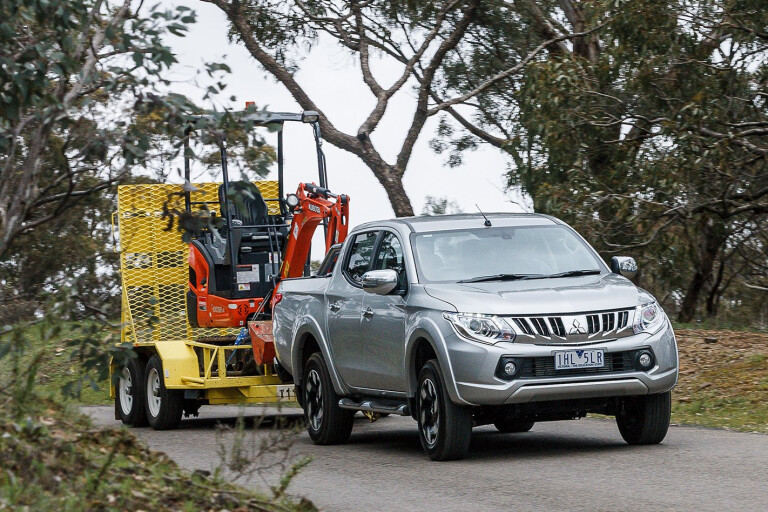
Today’s popular 4x4 dual-cabs make big claims when it comes to tow ratings and payloads, but are they really up to serious yakka?
We test the 2016 Mitsubishi Triton to see how its GCM, GVM and Payload fare against other industry icons.
LOAD TEST
The Triton was a new design in early 2015. Most notably it got a new-generation 2.4-litre engine, the smallest of our test vehicles with the exception of the Navara, which is only 2.3 litres but packs twin turbos for extra grunt.
The Triton is notably smaller and lighter than the Ranger and BT-50 in particular, but also smaller than the Colorado and the D-Max.
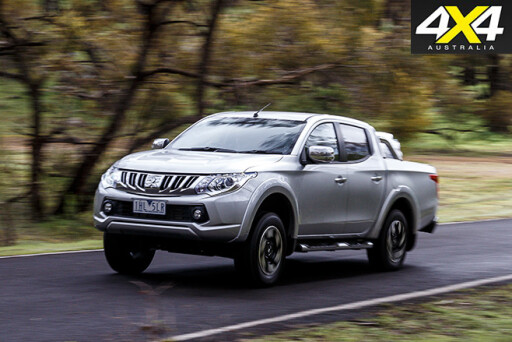 The Triton’s tub has four small and less useful tie-downs and, once loaded, the Triton’s rear sank some 105mm, which is not far shy of twice the droop observed in the utes least impacted by the same load. Trouble is, the Triton has a notably shorter wheelbase and most of the tub is behind the line of the rear axle.
The Triton’s tub has four small and less useful tie-downs and, once loaded, the Triton’s rear sank some 105mm, which is not far shy of twice the droop observed in the utes least impacted by the same load. Trouble is, the Triton has a notably shorter wheelbase and most of the tub is behind the line of the rear axle.
The 800kg pallet plus driver, observer and tow bar bumped into the Triton’s legal payload. The base-spec model is okay but the top-spec Exceed falls 40kg short – so technically our observer should have had to get out and walk!
Heading up our hill with that 800kg in the tub the Triton felt nose-up, although the steering feel and general chassis stability remained okay even as the rear suspension bottomed out over the bigger bumps.
Worth noting is that the Triton is the only ute to offer full-time 4x4, via Mitsubishi’s Super Select system, which also has a 2WD mode. On dry roads this is no big deal, but in the wet or when towing heavy loads, full-time 4x4 brings significant drivability and safety advantages.
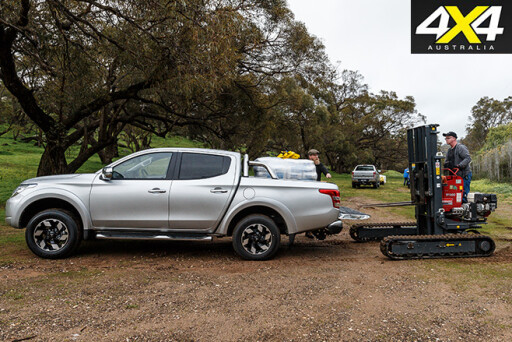 While the Triton’s chassis certainly reacted to the weight of the pallet, the 2.4-litre engine made a much better fist of things. It needed more revs than the other engines to do the job – maximum torque is at 2500rpm – but nevertheless it still did it well.
While the Triton’s chassis certainly reacted to the weight of the pallet, the 2.4-litre engine made a much better fist of things. It needed more revs than the other engines to do the job – maximum torque is at 2500rpm – but nevertheless it still did it well.
While it needs to rev, it’s happy doing it and remained quiet and refined. If there’s one way to make a smooth-running and quiet diesel, it’s to drop the capacity to minimise the inherent vibration of an inline four configuration. A big four will vibrate more than a little one, it’s as simple as that.
The engine does well despite having only five ratios to play with in a gearbox that now feels old in terms of shift quality. One positive here is that the Triton is the only ute with paddle shifters, which are more than handy for controlling descents, given the Triton doesn’t offer much engine braking.
TOW TEST
I have to admit I wasn’t holding high hopes for the Triton’s performance. It’s specced for lighter towing, and the short wheelbase and long rear overhang has it pegged as not being the most worthy of towing contenders.
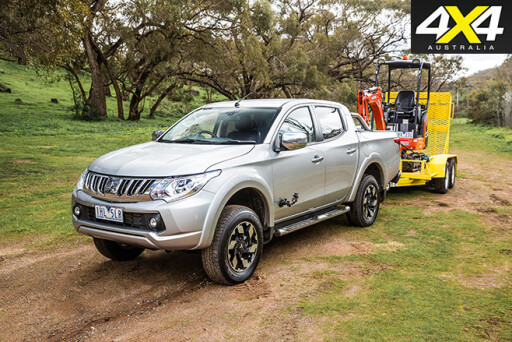 Well, I was most surprised. Our lighter 2800kg trailer didn’t have as much vertical impact on the Triton’s posterior as I thought. It knew it was there but it didn’t drag its bum on the ground.
Well, I was most surprised. Our lighter 2800kg trailer didn’t have as much vertical impact on the Triton’s posterior as I thought. It knew it was there but it didn’t drag its bum on the ground.
The big star is the performance of the Triton’s 133kW 2.4-litre engine. The diminutive donk punched above its weight once it got some boost and rpm and its 430Nm came into play. Sure, it’s a revvy little unit and suffers from turbo lag off the line, but at peak torque between 2500 and 3000rpm it really steps up to the mark.
While the gearbox needs a nudge to do the right thing, this was made easy by the rather nifty paddle shifters on the steering column, making manual intervention just a fingertip away. Mitsubishi is to be commended for leaving those paddles fixed to the column, rather than spinning with the wheel. It ain’t no sports car and the fixed paddle position is much more practical on a 4x4 load hauler.
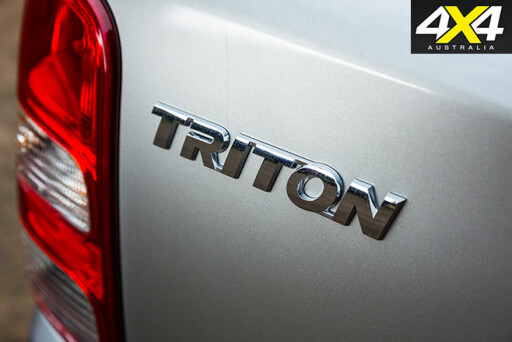 The smaller capacity means the engine doesn’t give much back pressure, so leaning on it to try and hold the Triton back on the downhill run while under load resulted in higher revs, rather than any real braking.
The smaller capacity means the engine doesn’t give much back pressure, so leaning on it to try and hold the Triton back on the downhill run while under load resulted in higher revs, rather than any real braking.
SPECS: MITSUBISHI TRITON*
Engine 2.4 litre 4-cyl turbo-diesel
Max Power/Torque 133kW/430Nm
Gearbox five-speed automatic
4X4 System dual-range full-time (+2WD)
Kerb Weight 1930kg to 1965kg
GVM 2900kg
Payload 935kg to 970kg
Towing capacity 3100kg
Towball download 310kg
GCM 5885kg
Fuel tank capacity 75L
ADR fuel claim 7.6L/100km
*4x4 dual-cab pick-up automatics only
MITSUBISHI TRITON PRICES*
GLX $36,490
GLX+ $36,990
GLS $40,990
Exceed (auto) $47,790
*4x4 dual-cab pick-up manual only unless noted
MORE: Mitsubishi Triton Range Review
MORE: Mitsubishi Triton Specs, Range & Price

COMMENTS